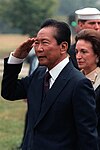1978 Philippine parliamentary election
| |||||||||||||||||||||||||||||||||||||||||||||||||||||||||||||||||||||||
165 seats of the Batasang Pambansa 83 seats needed for a majority | |||||||||||||||||||||||||||||||||||||||||||||||||||||||||||||||||||||||
|---|---|---|---|---|---|---|---|---|---|---|---|---|---|---|---|---|---|---|---|---|---|---|---|---|---|---|---|---|---|---|---|---|---|---|---|---|---|---|---|---|---|---|---|---|---|---|---|---|---|---|---|---|---|---|---|---|---|---|---|---|---|---|---|---|---|---|---|---|---|---|---|
| |||||||||||||||||||||||||||||||||||||||||||||||||||||||||||||||||||||||
| |||||||||||||||||||||||||||||||||||||||||||||||||||||||||||||||||||||||
 |
|---|
|
|
A general election was held in the Philippines on April 7, 1978 for the election of the 166 (of the 208) regional representatives to the Interim Batasang Pambansa (the nation's first parliament). The elections were participated by the leading opposition party, the Lakas ng Bayan (LABAN) which had twenty-one candidates for the Metro Manila area and the leading candidate was the jailed opposition leader Ninoy Aquino while the regime's party known as the Kilusang Bagong Lipunan (KBL) which was led by the then First Lady Imelda Marcos. Ninoy was allowed to run by the his fellow party mates in the Liberal Party who boycotted the elections but was not allowed to campaign, so his family campaigned for him. The night before the elections on April 6, 1978, a noise barrage was organized by the supporters of (LABAN) which occurred up to dawn.
Background
The Philippines was under martial law since 1972, thereby the incumbent president Ferdinand Marcos ruled by decree. Prior to this, the Constitution of the Philippines was being drafted by the Constitutional Convention whose delegates were elected in 1970. The Constitutional Convention approved the final draft of the Constitution which consisted of the abolition of the Philippine Congress and replaced with an interim National Assembly to consisted of the President, the Vice-President, the President of the Constitutional Convention and Members of the Senate and House of Representatives in November 1972 and later ratified on January 17, 1973 through so-called "citizens' assemblies". The Constitution were amended twice in July 27–28, 1973 and February 27–28, 1975. The Constitution was amended once again in October 16–17, 1976 which contained the "Amendment No. 6" which changed the name of the interim National Assembly from the "National Assembly" to "Batasang Pambansa" more commonly as the "Batasan".
Campaign
Lakas ng Bayan
In 1978, from his prison cell, Aquino was allowed to take part in the elections. Although his friends, former Senators Gerry Roxas and Jovito Salonga, preferred to boycott the elections, Aquino urged his supporters to organize and run 21 candidates in Metro Manila. Thus his political party, dubbed Lakas ng Bayan ("People's Power"), was born. The party's acronym was "LABAN" ("fight" in Tagalog). He was allowed one television interview on Face the Nation (hosted by Ronnie Nathanielsz) and proved to a startled and impressed populace that imprisonment had neither dulled his rapier-like tongue nor dampened his fighting spirit. Foreign correspondents and diplomats asked what would happen to the LABAN ticket. People agreed with him that his party would win overwhelmingly in an honest election. On April 6, 1978, supporters of the Lakas ng Bayan (LABAN), the opposition party headed by former Senator Benigno Aquino, Jr. who was still in jail and twenty other candidates contesting the Region IV-A (Metro Manila) seats, came out in protest by asking bystanders and cars to make noise in support the opposition.
Kilusang Bagong Lipunan
President Marcos created the Kilusang Bagong Lipunan (New Society Movement)
Results
Template:Philippine parliamentary election, 1978
See also
Further reading
- Philippine Commission on Elections — Records and Statistics Division
- Philippine House of Representatives Congressional Library
- Pobre, Cesar P. Philippine Legislature 100 Years. ISBN 971-92245-0-9.
{{cite book}}: Cite has empty unknown parameters:|origmonth=,|month=,|chapterurl=,|origdate=, and|coauthors=(help)


